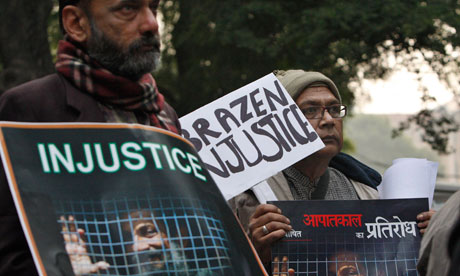Indian courts were under pressure yesterday to review a life sentence given to Dr Binayak Sen, an internationally acclaimed activist and pioneering rural paediatrician convicted on Christmas Eve of helping Maoist guerrillas.
Sen, whose work among the poor of the central state of Chhattisgarh has been praised around the world and won him the support of dozens of Nobel laureates, appeared on charges of sedition and conspiracy.
Sen, 58, was alleged to have been passing messages for leftwing guerrillas, Naxalites, and has been held without bail for more than two years. Activists in the US and in India demonstrated against the verdict and Amnesty International has strongly criticised the decision.
"Life in prison is an unusually harsh sentence for anyone, much less for an internationally recognised human rights defender who has never been charged with any act of violence," said Sam Zarifi, Amnesty's Asia-Pacific director. "State and federal authorities in India should immediately drop these politically motivated charges against Dr Sen and release him."
Newspapers unanimously condemned the decision. "The life sentence handed down to Binayak Sen by a Chhattisgarh trial court on Friday is so over the top and outrageous that it calls into question the fundamentals of the Indian justice system," read an editorial in The Hindu.
Indian authorities are struggling to contain a growing and entrenched insurgency by Naxalites, who have a presence in about a third of the country. Repeated offensives by often under-armed and poorly trained police or paramilitary forces have foundered.
Last week, Manmohan Singh, the Indian prime minister, said that leftwing ideologies posed a serious economic threat. "If we don't control Naxalism we have to say goodbye to our country's ambitions to sustain growth rate of 10-11% per cent per annum – that is the only way that we can get rid of chronic poverty, ignorance and disease that still afflicts millions and millions of our citizens," Singh told an audience of police graduates.
Supporters of Sen called the trial a farce, pointing out that prosecutors had attempted to link the doctor with Pakistan's Inter-Services Intelligence (ISI) agency by citing an email that also contained the line, "There is a chimpanzee in the White House". Prosecutors said that was "code language" for "terrorists are annoyed with the US". In fact, "ISI" referred to the Indian Social Institute, a leftwing think tank in Delhi.
The Calcutta Telegraph described the trial as an "absurd drama". Soli Sorabjee, a former attorney general of India, told CNN-IBN news channel that the judgment was shocking. "At this rate no human rights activist will be safe in the country," he said.
Sen, who counts Noam Chomsky among his supporters, had been living and working in remote areas of the state for more than 30 years, bringing healthcare to some of the poorest parts of India.
Chhattisgarh is rich in minerals and metals needed for India's booming economy, but local people rarely benefit from their extraction; conflicts over land are common. While the Maoists' leaders are often educated and from urban backgrounds, the footsoldiers are drawn from poverty-stricken rural communities, which have yet to benefit from India's rapid growth.
Violence linked to the insurgency continued to claim lives yesterday when one paramilitary policemen was killed and two others injured in an ambush by Naxalites in Chhattisgarh.










